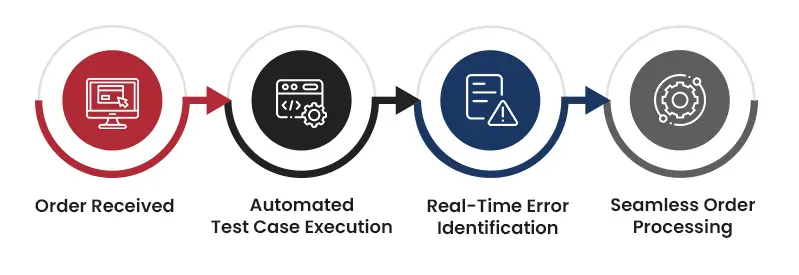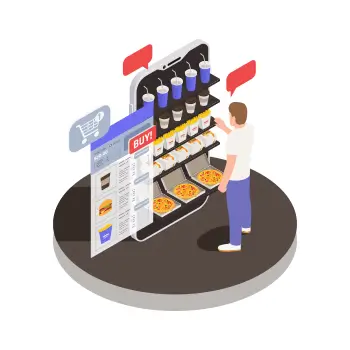- The Evolving Landscape of QSR Order Management
- QA’s Role in Ensuring Order Accuracy and Scalability
- Performance Testing Systems for Peak Times
- Automation: The Key to Faster QA Processes
- The Tx Advantage: Transforming Order Management for QSRs
- AI’s Impact on QA for the QSR Industry
- Conclusion: Partner with TestingXperts for Scalable Order Management
The global quick-service restaurant (QSR) industry is a marvel of speed, efficiency, and innovation. With endless orders processed across multiple platforms on daily basis – mobile apps, digital kiosks, and in-store systems –delivering a flawless customer experience needs Order Management Systems (OMS) that are meticulous. At the heart of these robust systems lies Quality Assurance (QA). This blog digs deeper into how QA delivers scalability and reliability for global QSR chains, ensuring them stay ahead in the competitive market.Â
The Evolving Landscape of QSR Order Management

The QSR industry faces many challenges, and time is of the essence. With customer expectations soaring, QSRs must ensure that order management systems (OMS) are agile, accurate, and scalable. As more customers turn to multiple platforms—apps, kiosks, and drive-thru—failure to meet demand during peak hours can lead to customer dissatisfaction, affecting the brand’s reputation. This growth also comes with its own set of benefits:
Omnichannel Complexity – Integrating various ordering platforms to create a unified experience. Â
Scalability – Ensuring systems handle the peak-hour traffic flawlessly. Â
Localization and Global Standards – Maintaining brand consistency while considering the regional tastes and regulations. Â
Example: For instance, McDonald’s operates globally and serves millions of customers daily. According to their reports, they operate over 38,000 locations globally and have implemented digital ordering platforms like kiosks, mobile apps, and delivery systems. Given the volume of transactions, their robust Quality Assurance (QA) process has ensured the scalability and reliability of their order management systems. Â
QA’s Role in Ensuring Order Accuracy and Scalability

QA’s role is highly critical for ensuring that order management systems can handle the stress of peak times. Without proper testing, QSRs risk missing out on potential sales during critical periods, and customer loyalty could be lost. For example, a nationwide promotion offering a free item could cause a flood of orders, causing system crashes if not adequately tested. Quality Assurance ensures the seamless functioning of order management systems, tackling the critical aspects as:Â
- Performance Testing: Assuring systems do not crash during high-load periods. Â
- Integration Testing: Checking smooth communication between the order platforms and backend systems. Â
- Functional Testing: Verifying the menu updates, its accuracy, payment processes, and promotional campaigns. Â
| QA Processes  | Impact on QSR Order Management  |
| Performance Testing | Handles traffic without slowdowns  |
| Integration Testing  | Ensures seamless interaction between apps, Kiosks, and delivery systems |
| Functional Testing  | Validates order accuracy and menu updates |
Performance Testing Systems for Peak Times
Imagine a nationwide promotion offering free fries during lunch hours. Without robust testing, there is a possibility to expect the surge in traffic which will be overwhelming, leading to app crashes and customer dissatisfaction. QA makes sure to deliver scalability by:Â
- Identifying potential bottlenecksÂ
- Simulated peak-hour traffic Â
- Proactively resolving vulnerabilities Â
This ensures that QSRs can roll out large-scale promotions without compromising user experience. Â
Automation: The Key to Faster QA Processes
QSR is a rapidly evolving industry, and speed is crucial. Manual testing can’t keep up with the rapid pace at which QSRs need to update their systems. AI-driven automation ensures faster testing cycles, reduces human error, and provides predictive insights that can prevent potential issues before they arise. QA companies, including Tx, leverage AI-driven tools to streamline order management testing. Automation can increase testing efficiency by up to 40%, reducing the time it takes to identify critical issues, thereby improving system reliability.Â
Key Benefits of Automation in QSR QA
- Reduced Manual Effort: Regression testing becomes quicker and error-free.Â
- Predictive Insights: AI identifies potential issues before they arise.Â
- Enhanced Efficiency: Test cycles are completed in a fraction of the time.Â
Automation in QSR Order Management Testing

Global Brands, Local Tastes: QA Balancing ActÂ
For global QSR chains, consistency is critical. Customers expect the same quality and service, whether ordering in New York or Tokyo. At the same time, localization is essential to cater to regional preferences. QA plays a pivotal role by:Â
- Testing multilingual interfaces.Â
- Ensuring localized promotions are accurate and functional.Â
- Verifying compliance with regional regulations.Â
Example: Starbucks offers region-specific beverages like Sakura Lattes in Japan while maintaining its core coffee menu globally.Â
The Tx Advantage: Transforming Order Management for QSRs

Every step in the QA process is tailored toward improving the customer experience. AI-driven QA allows QSRs to provide personalized customer experiences, whether offering tailored menu recommendations or ensuring a seamless, uninterrupted order experience. As customer expectations evolve, QSRs that work with innovative QA solutions will stay ahead of the curve, offering reliability and a more profound, engaging customer experience. Â
- Boost the software rollout speed by 150%.Â
- Modernize POS systems across 12,000+ stores.Â
- Increase the test coverage by 90%.Â
- Save $1.2 millions on QA budgets annually. Â
Here’s one of the top examples of how Tx has helped the top QSR industry manage orders seamlessly. One of the largest fast food restaurant chains, a leader in the QSR space, has seen significant improvements in order accuracy and delivery speed by leveraging AI for its order management systems. This has not only led to increased customer satisfaction but has also saved the company millions annually in operational costs.Â
The Quick-Service Restaurant (QSR) industry is undergoing a revolutionary shift as AI-Powered solutions increasingly reshape how businesses operate. Quality Assurance (QA) in the QSR domain is no longer confined to detecting errors. It is now a driving force behind automation, predictive analytics, and real-time decision-making. With increasing customer demands for personalized experiences, AI-led QA innovations are critical for enhancing efficiency, scalability, and operational excellence in order management systems. Â
AI’s Impact on QA for the QSR Industry
AI-driven technologies are empowering QSRs to predict challenges, adapt to the evolving demands, and optimize their systems in extraordinary ways. These innovations are helping businesses not just analyze the issues but also anticipate them before they escalate. From ensuring the smooth functioning of digital ordering platforms to enhancing supply chain management, AI is creating a holistic approach to QA. Â
Key Benefits of AI in QSR QA

- Predictive AnalyticsÂ
AI systems can analyze historical data and application usage patterns to forecast potential system bottlenecks. Predictive QA helps mitigate risks such as app downtime during peak hours, ensuring higher availability and a smooth customer experience.Â
- Enhanced PersonalizationÂ
Machine Learning (ML) algorithms enable QSRs to tailor menu recommendations and promotions based on customer preferences, leading to improved engagement and satisfaction.Â
- Real-Time Monitoring and AdaptationÂ
AI systems continuously monitor application performance, instantly identifying and resolving issues. This ensures minimal disruption during high-traffic periods or large-scale promotional campaigns.Â
AI-Led QA Innovations in Practice
QSR chains are implementing AI for different aspects of order management and QA processes. Here’s how AI is changing the industry:Â
- End-to-End Test Automation:Â
AI tools can automate the whole testing lifecycle, reducing time-to-market and minimizing human error. Automated regression testing ensures that every update in the OMS is seamlessly integrated. Â
- Proactive Issue Detection:Â
AI-driven tools can check the system logs and user data to analyze the application failures or performance drops. This approach lessens the downtime and improves reliability. Â
- Voice and Chatbot Testing:Â
With the rise of voice-activated ordering systems and AI-powered chatbots, QA can now focuses on ensuring natural language processing (NLP) systems work accurately across languages and accents.Â
- Inventory and Supply Chain Optimization:Â
AI can integrate real-time data from POS systems with inventory databases, making sure stock is managed and food wastage is reduced. Â
Conclusion: Partner with TestingXperts for Scalable Order Management
QA plays a crucial role in ensuring scalable order management. Leveraging technologies like AI and automation, QSRs can improve accuracy, handle high volumes, and enhance the customer experience. Partnering with Tx helps build a reliable and efficient order management system for the future. Tx’s expertise in delivering customized QA solutions has helped international QSR chains streamline operations, enhance customer satisfaction, and drive business growth. Â
Let’s build the future of QSR order management together. Reach out to Tx to learn how we can help transform your OMS.Â
FAQsÂ
Q1. How does AI impact quality assurance in QSR?Â
AI enhances QA by automating repetitive tasks, improving predictive analytics, and ensuring real-time issue detection, enabling faster delivery of reliable, scalable order management systems tailored for global QSR chains.Â
Q2. Will AI replace QA professionals in scalable order management for global QSR chains? Â
AI complements QA professionals by automating tasks and boosting efficiency but cannot replace the strategic insights and decision-making that professionals bring to ensure order management systems remain robust and scalable.Â
Q3. How does QA ensure order accuracy and scalability for global QSR chains? Â
QA verifies data accuracy, stress-tests systems under peak loads, and ensures seamless integration of ordering, payment, and delivery platforms, delivering reliable, scalable solutions tailored for global QSR needs.Â
Q4. What role does TestingXperts (Tx) play in transforming QSR order management? Â
TestingXperts revolutionizes QSR order management with tailored QA strategies, leveraging automation and AI to enhance accuracy, scalability, and seamless customer experiences for global QSR brands.Â
Â
The post How QA Powers Scalable Order Management for Global QSR Chains first appeared on TestingXperts.
Source: Read More

